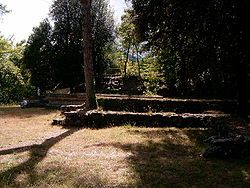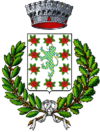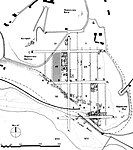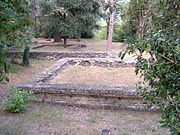Marzabotto
Marzabotto | |
|---|---|
| Comune di Marzabotto | |
 Marzabotto acropolis | |
| Coordinates: 44°20′20″N 11°12′20″E / 44.33889°N 11.20556°E | |
| Country | Italy |
| Region | Emilia-Romagna |
| Metropolitan city | Bologna (BO) |
| Frazioni | see list |
| Government | |
| • Mayor | Valentina Cuppi |
| Area | |
• Total | 74 km2 (29 sq mi) |
| Elevation | 130 m (430 ft) |
| Population (30 September 2017)[2] | |
• Total | 6,826 |
| • Density | 92/km2 (240/sq mi) |
| Demonym | Marzabottesi |
| Time zone | UTC+1 (CET) |
| • Summer (DST) | UTC+2 (CEST) |
| Postal code | 52100 |
| Dialing code | 051 |
| Patron saint | Saint Joseph and Saint Charles [3] |
| Saint day | March 19 |
| Website | Official website |
Marzabotto (Medial Mountain Bolognese: Marzabòt) is a small town and comune in Italian region Emilia-Romagna, part of the Metropolitan City of Bologna. It is located 27 kilometres (17 mi) south-southwest of Bologna by rail, and lies in the valley of the Reno. The area includes the site of an ancient Etruscan city and also the place of a modern massacre that took place there during World War II.
Etruscan city
[edit]In and below the grounds of the Villa Aria, close to the city, are the remains of an Etruscan town of the 5th century BC, Kainua, protected on the west by the mountains, on the south-east by the river, which by a change of course has destroyed about half of it.[4][5] The acropolis was just below the villa: here remains of temples were found.
The town lay below the modern high-road and was laid out on a rectangular plan divided by main streets into eight quarters, and these in turn into blocks or insulae.[6] Necropoleis were found on the east and north of the site.[7] The place was partially inhabited later by the Gauls, but was not occupied by the Romans.[8]
World War II massacre
[edit]On September 29, 1944, during the World War II German occupation of Italy, the town was the site of the worst massacre of civilians committed by the Waffen SS in Italy.[9] In reprisal of the local support given to the partisans and the resistance movement, soldiers of the SS-Panzer-Aufklärungsabteilung 16, killed systematically hundreds of civilians in Marzabotto, and in the adjacent Grizzana Morandi and Monzuno.[10] The town was awarded the Gold Medal of Military Valour for this episode. Sculptor Nicola Zamboni created a large monument in the city in 1975 in front of the town hall.[11]
References
[edit]- ^ "Superficie di Comuni Province e Regioni italiane al 9 ottobre 2011". Italian National Institute of Statistics. Retrieved 16 March 2019.
- ^ "Popolazione Residente al 1° Gennaio 2018". Italian National Institute of Statistics. Retrieved 16 March 2019.
- ^ There are several saints called Charles (Italian: San Carlo). None of their feast days is on March 19, so this may be a local saint. Alternatively, the local church may contain relics of one of the known Saint Charles.
- ^ Pearce, M., R. Peretto, P. Tozzi, DARMC, R. Talbert, S. Gillies, T. Elliott, J. Becker. "Places: 393448 (Marzabotto)". Pleiades. Retrieved March 12, 2016.
{{cite web}}: CS1 maint: multiple names: authors list (link) - ^ Sybille Haynes (1 September 2005). Etruscan Civilization: A Cultural History. Getty Publications. pp. 188–. ISBN 978-0-89236-600-2.
- ^ Luisa Banti (1973). Etruscan Cities and Their Culture. University of California Press. pp. 9–. ISBN 978-0-520-01910-2.
- ^ Paolo Bernardini; Giovannangelo Camporeale (2004). The Etruscans Outside Etruria. Getty Publications. pp. 182–. ISBN 978-0-89236-767-2.
- ^ The Etruscan town of Marzabotto Archaeological site and National Etruscan Museum "Pompeo Aria" http://www.archeobologna.beniculturali.it/marzabotto/note_en.htm
- ^ Alexander Mikaberidze (25 June 2013). Atrocities, Massacres, and War Crimes: An Encyclopedia [2 Volumes]: An Encyclopedia. ABC-CLIO. pp. 441–. ISBN 978-1-59884-926-4.
- ^ Nigel Cawthorne (24 July 2012). The Story of the SS. Arcturus Publishing. pp. 142–. ISBN 978-1-84858-947-6.
- ^ Luciano Galmozzi (1986). Monumenti alla libertà: antifascismo, resistenza e pace nei monumenti italiani dal 1945 al 1985. La Pietra. p. 152.
- This article incorporates text from a publication now in the public domain: Chisholm, Hugh, ed. (1911). "Marzabotto". Encyclopædia Britannica (11th ed.). Cambridge University Press.







